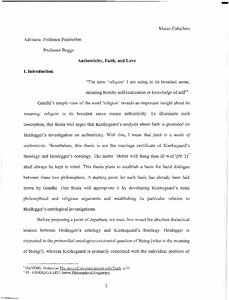| dc.rights.license | In Copyright | en_US |
| dc.creator | Caballero, Mateo | |
| dc.date.accessioned | 2023-10-20T15:49:18Z | |
| dc.date.available | 2023-10-20T15:49:18Z | |
| dc.date.created | 2004 | |
| dc.identifier | WLURG038_Caballero_thesis_2004 | |
| dc.identifier.uri | https://dspace.wlu.edu/handle/11021/36247 | |
| dc.description.abstract | "The term 'religion' I am using in its broadest sense, meaning thereby self-realization or knowledge of self." Gandhi's simple view of the word 'religion' reveals an important insight about its
meaning: religion in its broadest sense means authenticity. To illuminate such conception, this thesis will argue that Kierkegaard's analysis about faith is grounded on Heidegger's investigation on authenticity. With this, I mean that faith is a mode of authenticity. . . . This thesis plans to establish a basis for lucid dialogue between these two philosophers. A starting point for such basis has already been laid down by Gandhi. This thesis will appropriate it by developing Kierkegaard's main philosophical and religious arguments and establishing its particular relation to
Heidegger's ontological investigations. Before proposing a point of departure, we must first reveal the absolute dialectical tension between Heidegger's ontology and Kierkegaard's theology. Heidegger is interested in the primordial ontologico-existential question of Being (what is the meaning of Being?), whereas Kierkegaard is primarily concerned with the individual problem of existence (what is the meaning of human existence?). For Heidegger the problem of existence cannot be understood without previous ontological clarity; thus, he notes: "In the nineteenth century, S0ren Kierkegaard explicitly seized upon the problem of existence as a [personal] problem, and thought it through in a penetrating fashion. But the existential problematic was so alien to him that, as regards his ontology, he remained completely dominated by Hegel and by ancient philosophy as Hegel saw it". What does Heidegger mean by affirming that the existential problematic is alien to Kierkegaard? If he means that it does not concern faith, then Kierkegaard holds that faith always remains alien to such an existential problematic. However, Heidegger seems to suggest that it is foreign to Kierkegaard's thinking, but this is not so. Kierkegaard's theology is ontologically very responsive to the problem of existence. For Kierkegaard, this problem is that of the relation of the individual to his own self: "every man is a spiritual being, for whom the truth consists in nothing else than the self-activity of personal appropriation". It is a problem about passion, commitment, and inwardness. Ontological understanding intensifies the problem but only goes so far. This absolute tension between the two authors is a bridge and a barrier. It is a barrier in so far as it maintains that Kierkegaard's theology has no regard for ontology. This thesis will argue extensively against this view. It is a bridge, because Heidegger argues that the
problem of existence is better understood within ontology, and Kierkegaard recognizes such understanding, but holds that this problem remains ultimately alien to any understanding. Thus, this tension is not an opposition but a relation between inwardness and ontology, and accordingly, between faith and authenticity. [From Introduction] | en_US |
| dc.format.extent | 53 pages | en_US |
| dc.language.iso | en_US | en_US |
| dc.rights | This material is made available for use in research, teaching, and private study, pursuant to U.S. Copyright law. The user assumes full responsibility for any use of the materials, including but not limited to, infringement of copyright and publication rights of reproduced materials. Any materials used should be fully credited with the source. | en_US |
| dc.rights.uri | http://rightsstatements.org/vocab/InC/1.0/ | en_US |
| dc.subject.other | Washington and Lee University -- Honors in Philosophy | en_US |
| dc.title | Authenticity, Faith and Love | en_US |
| dc.type | Text | en_US |
| dcterms.isPartOf | WLURG038 - Student Papers | en_US |
| dc.rights.holder | Caballero, Mateo | en_US |
| dc.subject.fast | Kierkegaard, S�ren, 1813-1855 | en_US |
| dc.subject.fast | Hegel, Georg Wilhelm Friedrich, 1770-1831. | en_US |
| dc.subject.fast | Ontology | en_US |
| dc.subject.fast | Philosophy | en_US |
| local.department | Philosophy | en_US |
